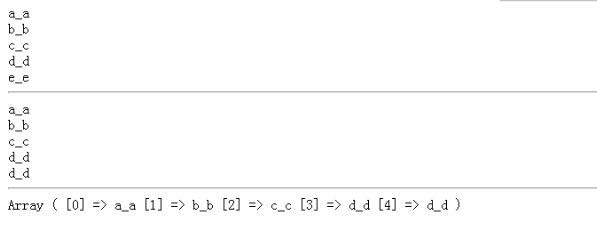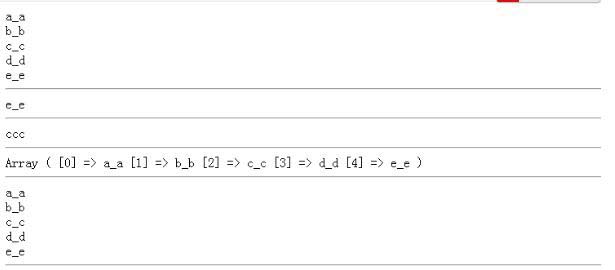 Backend Development
Backend Development
 PHP Tutorial
PHP Tutorial
 A brief discussion on the pitfalls of using reference variables in foreach in PHP
A brief discussion on the pitfalls of using reference variables in foreach in PHP
A brief discussion on the pitfalls of using reference variables in foreach in PHP
I have been writing PHP for many years, but I still make low-level mistakes. Today I encountered a pitfall when referencing variables in foreach. The PHP version is 5.6.12. The code is as follows:
<?php
$arr = ['a', 'b', 'c', 'd', 'e'];
foreach ($arr as $i=>&$a) {
$a = $a.'_'. $a;
echo $a .'<br>';
}
echo '<hr>';
foreach ($arr as $i=>$a) {
echo $a .'<br>';
}
echo '<hr>';
print_r($arr);Output results

When I first saw the output result of the second foreach, I felt very confused. How could two d_d be output?
After thinking about it carefully, it turns out that the scope of $a in PHP foreach is a local variable of the entire function, which is still valid outside the loop, rather than being enclosed within the loop,
So when the second foreach is executed, $a is not a new variable, but still points to the address reference of the fifth element of the $arr array.
When the second foreach is looping, it is actually in Constantly assign values to the 5th element of the $arr array,
Specific assignment situation,
First time: a_a is assigned to the 5th element, the result is: [a_a, b_b, c_c, d_d,a_a]
The second time: b_b is assigned to the fifth element, the result is: [a_a, b_b, c_c, d_d,b_b]
The third time: c_c is assigned Assign the value to the 5th element, the result is: [a_a, b_b, c_c, d_d,c_c]
The fourth time: d_d is assigned to the 5th element, the result is: [a_a, b_b, c_c, d_d, d_d]
The fifth time: At this time, because the fifth element has become d_d, d_d is assigned to the fifth element again, and the result is still: [a_a, b_b, c_c, d_d,d_d]
Solution:
1. Try not to use the same loop variable name;
2. Perform unset($a); after each use or before using it again. To cancel the address application
still use the above code example:
$arr = ['a', 'b', 'c', 'd', 'e'];
foreach ($arr as $i=>&$a) {
$a = $a.'_'. $a;
echo $a .'<br>';
}
echo '<hr>';
echo $a;
echo '<hr>';
// 这里 unset 掉
unset($a);
echo $a = 'ccc';
echo '<hr>';
print_r($arr);
echo '<hr>';
foreach ($arr as $i=>$a) {
echo $a .'<br>';
}
echo '<hr>';
print_r($arr);Output result:

Now it is normal, these small details must be Attention
The above is the brief discussion brought by the editor about the pitfalls of using reference variables in foreach in PHP. I hope everyone will support the PHP Chinese website~
More brief discussions Please pay attention to the PHP Chinese website for related articles about the pitfalls of using reference variables in foreach in PHP!

Hot AI Tools

Undresser.AI Undress
AI-powered app for creating realistic nude photos

AI Clothes Remover
Online AI tool for removing clothes from photos.

Undress AI Tool
Undress images for free

Clothoff.io
AI clothes remover

Video Face Swap
Swap faces in any video effortlessly with our completely free AI face swap tool!

Hot Article

Hot Tools

Notepad++7.3.1
Easy-to-use and free code editor

SublimeText3 Chinese version
Chinese version, very easy to use

Zend Studio 13.0.1
Powerful PHP integrated development environment

Dreamweaver CS6
Visual web development tools

SublimeText3 Mac version
God-level code editing software (SublimeText3)

Hot Topics
 1386
1386
 52
52
 Alipay PHP SDK transfer error: How to solve the problem of 'Cannot declare class SignData'?
Apr 01, 2025 am 07:21 AM
Alipay PHP SDK transfer error: How to solve the problem of 'Cannot declare class SignData'?
Apr 01, 2025 am 07:21 AM
Alipay PHP...
 Explain JSON Web Tokens (JWT) and their use case in PHP APIs.
Apr 05, 2025 am 12:04 AM
Explain JSON Web Tokens (JWT) and their use case in PHP APIs.
Apr 05, 2025 am 12:04 AM
JWT is an open standard based on JSON, used to securely transmit information between parties, mainly for identity authentication and information exchange. 1. JWT consists of three parts: Header, Payload and Signature. 2. The working principle of JWT includes three steps: generating JWT, verifying JWT and parsing Payload. 3. When using JWT for authentication in PHP, JWT can be generated and verified, and user role and permission information can be included in advanced usage. 4. Common errors include signature verification failure, token expiration, and payload oversized. Debugging skills include using debugging tools and logging. 5. Performance optimization and best practices include using appropriate signature algorithms, setting validity periods reasonably,
 Describe the SOLID principles and how they apply to PHP development.
Apr 03, 2025 am 12:04 AM
Describe the SOLID principles and how they apply to PHP development.
Apr 03, 2025 am 12:04 AM
The application of SOLID principle in PHP development includes: 1. Single responsibility principle (SRP): Each class is responsible for only one function. 2. Open and close principle (OCP): Changes are achieved through extension rather than modification. 3. Lisch's Substitution Principle (LSP): Subclasses can replace base classes without affecting program accuracy. 4. Interface isolation principle (ISP): Use fine-grained interfaces to avoid dependencies and unused methods. 5. Dependency inversion principle (DIP): High and low-level modules rely on abstraction and are implemented through dependency injection.
 How to automatically set permissions of unixsocket after system restart?
Mar 31, 2025 pm 11:54 PM
How to automatically set permissions of unixsocket after system restart?
Mar 31, 2025 pm 11:54 PM
How to automatically set the permissions of unixsocket after the system restarts. Every time the system restarts, we need to execute the following command to modify the permissions of unixsocket: sudo...
 How to debug CLI mode in PHPStorm?
Apr 01, 2025 pm 02:57 PM
How to debug CLI mode in PHPStorm?
Apr 01, 2025 pm 02:57 PM
How to debug CLI mode in PHPStorm? When developing with PHPStorm, sometimes we need to debug PHP in command line interface (CLI) mode...
 Explain the concept of late static binding in PHP.
Mar 21, 2025 pm 01:33 PM
Explain the concept of late static binding in PHP.
Mar 21, 2025 pm 01:33 PM
Article discusses late static binding (LSB) in PHP, introduced in PHP 5.3, allowing runtime resolution of static method calls for more flexible inheritance.Main issue: LSB vs. traditional polymorphism; LSB's practical applications and potential perfo
 How to send a POST request containing JSON data using PHP's cURL library?
Apr 01, 2025 pm 03:12 PM
How to send a POST request containing JSON data using PHP's cURL library?
Apr 01, 2025 pm 03:12 PM
Sending JSON data using PHP's cURL library In PHP development, it is often necessary to interact with external APIs. One of the common ways is to use cURL library to send POST�...
 Explain late static binding in PHP (static::).
Apr 03, 2025 am 12:04 AM
Explain late static binding in PHP (static::).
Apr 03, 2025 am 12:04 AM
Static binding (static::) implements late static binding (LSB) in PHP, allowing calling classes to be referenced in static contexts rather than defining classes. 1) The parsing process is performed at runtime, 2) Look up the call class in the inheritance relationship, 3) It may bring performance overhead.



